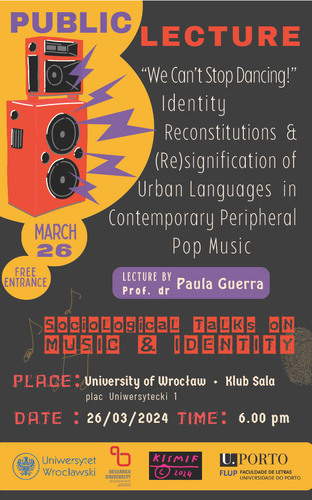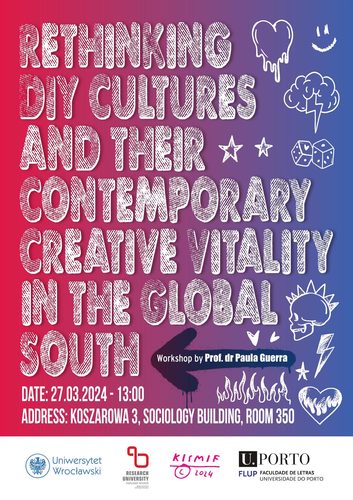Znajdujesz się w: Strona główna > Wydarzenia > Wizyta prof. Pauli Guerri (Uniwersytet Porto) w Instytucie Socjologii Uniwersytetu Wrocławskiego
Serdecznie zapraszamy na wydarzenia naukowe związane z pobytem gościnnym prof. Pauli Guerri (Uniwersytet Porto) w Instytucie Socjologii Uniwersytetu Wrocławskiego. Wizyta odbywa się w ramach programu przyjazdów profesorów wizytujących „Inicjatywa Doskonałości – Uczelnia Badawcza (IDUB).
Wtorek, 26 marca 2024 r., godz. 18.00, Sala Klubu Uniwersytetu Wrocławskiego, plac Uniwersytecki 1
Wykład gościnny „We Can't Stop Dancing! Identity Reconstitutions and (Re)signification of Urban Languages in Contemporary Peripheral Pop Music”

Środa, 27 marca 2024 r., godz. 13.00, Instytut Socjologii UWr, ul. Koszarowa 3, bud. 20, sala 350
Warsztaty „Rethinking DIY Cultures and their Contemporary Creative Vitality in the Global South”

Abstrakt wykładu:
We Can't Stop Dancing! Identity Reconstitutions and (Re)signification of Urban Languages in Contemporary Peripheral Pop Music
Lisbon, like other cities, has been reinventing itself based on culture, a strategy of culturalization of the economy, but with a focus on the Other as a source of cultural wealth, of a multicultural city open to the world. In a context of postcolonial globalization of culture, the discourse of national exceptionalism Portuguese need an update, as a narrative based on colonial discovery has become politically unacceptable and inappropriate in a context of global competition. Lisbon, in its search for a new self-representation and identity affirmation, directed its interest to the music of the periphery, such as kuduro. Initially, kuduro was relegated to the outskirts of Lisbon, where the majority of the Afro-descendant population lived (and still lives); which is not to say that there was no African music in the clubs in the center of the capital, but above all more traditional genres were heard, such as quizomba and a kuduro diluted with Western house, a way to make it more cosmopolitan (Elliot, 2022). Kuduro was somewhere in between: for the older generation of immigrants, the music that connected them to their roots was the most traditional, such as semba, while the younger ones were closer to genres such as hip-hop or house. For the former, it was too modern; for the latter, too African (Epalanga, 2018; Belanciano, 2020). Just as Buraka Som Sistema became almost synonymous with kuduro Portuguese, the neighbourhood of Quinta do Mocho, in Sacavém on the outskirts of Lisbon, also became a central place of new Portuguese popular music, namely batida and kuduro. It is a neighbourhood inhabited mostly by immigrants from the former Portuguese colonies and often associated in the media with news about crime and gangs. A situation that has been changing, due to cultural and artistic programs, closely related to urban art and music, such as the Public Art Gallery. It is a set of participatory projects, with a strong mobilization of local inhabitants, to refute the stigmas that are still associated with this place. There is, therefore, a need for visibility and representation, and it is precisely for this reason that there is a concern, on the part of several artists, to be seen in the neighbourhood. It is no coincidence that DJ Marfox, perhaps the agent with the most legitimacy in the kuduro/batida music scene, makes a point of giving his interviews in the neighborhood. Presence, although contested, is a fundamental dimension in cities, and perhaps there are no more consequential strategies than using the arts and music as expressive ways to display this presence, to think about blackness and black Lisbon, not as an abstract Other, but as bodies that are part of the city. creative bodies involved in practices of cultural creation, production and dissemination. DJ Marfox and the label Príncipe Discos have made it possible to discuss the changes in contemporary Portuguese identities because it allows the validation and (re)signification of urban languages that were previously declassified, often created in peripheral, segregated and ghettoized contexts. It is a proposal based on mixing, diversity, participation, and collaboration. But it is also a project of visibility, reparation, and representation.
References
Belanciano, V. (2020). Não dá para ficar parado. Música afro-portuguesa: celebração, conflito e esperança. Porto: Afrontamento.
Elliot, R. (2022). DJs do Guetto. London/New York: Bloomsbury.
Epalanga, K. (2017). Os brancos também sabem dançar: um romance musical. Alfragide: Caminho.
Bennett, A. & Guerra, P. (eds.) (2019). DIY Cultures and Underground Music Scenes. Collection Routledge Advances in Sociology. Oxford: Routledge.
Abstrakt warsztatów
Rethinking DIY Cultures and their Contemporary Creative Vitality in the Global South
Beginning in the mid-1970s, the notion of do-it-yourself (DIY) culture evolved from an ethos of resistance to the mainstream music industry, centered on punk, to a more widely endorsed aesthetic that underpins a broad sphere of alternative cultural production. While not avoiding counter-hegemonic concerns, this transformation of DIY into what could reasonably be called a global alternative culture has also seen it evolve into a level of professionalism that aims to ensure cultural and, where possible, economic sustainability. During a period in which the very concept of culture is the subject of various attempts at hyper-commodification, under the ever-widening banner of the cultural industries, the many cultural professionals who wish to remain independent have benefited at the same time from the increasing emphasis, in urban centres, on cultural production, performance and consumption. In fact, these professionals are often able to hone the creative skills acquired while participating in underground cultural scenes and alternatives for their use in careers as DIY cultural entrepreneurs. This workshop examines the longevity of DIY cultural aesthetics and its evolution in the context of the Global South – namely in Portugal and Brazil. From its roots in the punk movement, the DIY concept has grown to encompass a highly complex and vibrant alternative sector of cultural production and consumption on a global scale.
Biogram prof. Pauli Guerri
Paula Guerra is Associate Professor of Sociology at the University of Porto and Researcher at the Institute of Sociology of the same University. Paula is an Adjunct Associate Professor of the Griffith Centre for Social and Cultural Research in Australia. She is founder/coordinator of the Network All the Arts: Luso-Afro-Brazilian Network of the Sociology of Culture and the Arts. Paula is the founder/coordinator of the KISMIF (kismifconference.com and kismifcommunity.pt). Paula is member of the Board of the Research Network of Sociology of Art of ESA and Chair of the Portuguese Branch of the International Association for the Study of Popular Music. She coordinates several research projects subordinated to the youth cultures, sociology of the arts and culture, co-creation, methodology and research techniques, DIY cultures, among other subjects. She has likewise advised and supervised several Masters, PhD and Post-Doc projects in the aforementioned areas. She is a member of the editorial council of several national and international journals, as well as editor and reviewer of several articles and books on a national and international level. Paula is editor-in-chief (with Andy Bennett) of SAGE journal DIY, Alternative Cultures and Society.